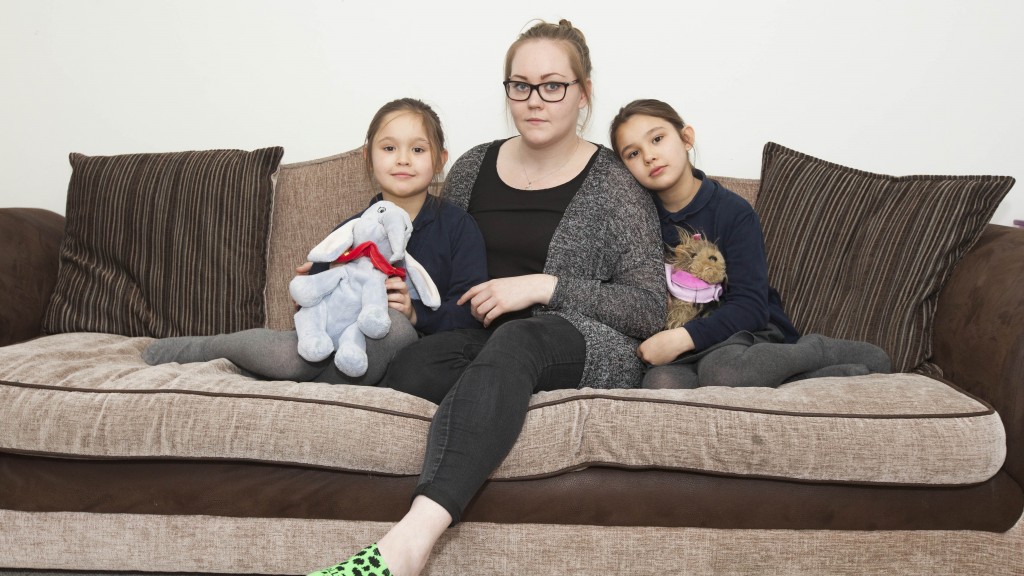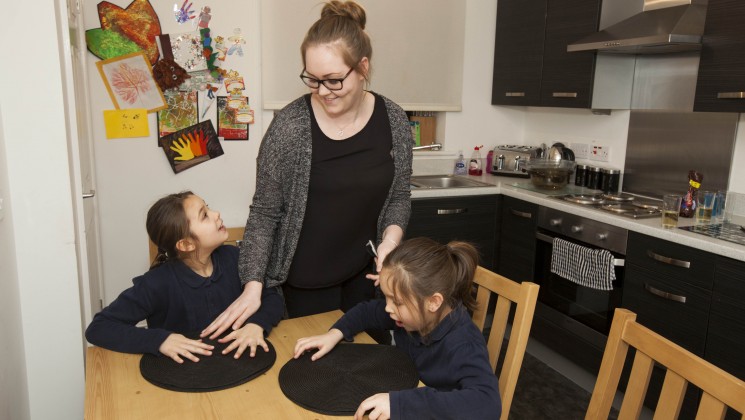The government’s tax credit U-turn has saved many workers from a huge drop in income. But low pay still looms large for UNISON members.
Kati Conway has just finished a short day at work, so she can be in the playground by 3.20pm to pick up her daughters Zakirah (six) and Yasmeen (eight) from school. There are already a few Father Christmas hats and reindeer antlers on display as the children emerge from their classrooms. Kati and the girls are a cheerful family heading home for tea on this December afternoon. There’s even more of a spring in Kati’s step since chancellor George Osborne’s dramatic U-turn over family tax credits at the last budget.
For the last four years, 25-year-old Kati has worked as a technical support officer at Kesteven District Council’s environmental health department. As a single mum on a salary of £17,500, she stood to lose £1,974.20 a year if the tax credits had been stopped, but she would only have gained £80 a year from the changes in tax allowances. The introduction of the chancellor’s living wage wouldn’t have affected her at all – she currently earns 50p an hour more than that.
So what was Kati planning to do if the tax credits had been introduced after Christmas?
“I really had no idea what I would do,” she admits. “I’d come to the decision that I’d probably have to stop working, because I wouldn’t be able to afford the childcare.”
Far from triumphalist
As an active UNISON member (she is vice-chair of both the regional and national young members’ forum) Kati campaigned hard to raise awareness of the real impact that getting rid of tax credits would have on families like hers. She appeared in the Daily Mirror and on BBC Radio 5 Live alongside several MPs, and felt that she managed to get her message across. But although she’s delighted at the chancellor’s change of heart, she’s far from triumphalist.
“At last I’m able to sleep again at night – for now,” she says. But in the longer term, the introduction of the universal credit is still a worry, as is the ongoing issue of the public sector pay freeze. Kati herself has only had a 2% pay rise in the last four years.
“I am concerned for me and my family, of course – I want to provide for my children the best that I can. But it doesn’t just affect me, and it doesn’t just affect single parent families,” she points out. Low pay in the public sector affects her friends, her family members and her colleagues.
“People used to say, ‘Get in with the council, that’s blooming marvellous!’” she laughs. “But inflation goes up, prices go up and our wages stay the same.”
UNISON research has shown that council workers’ pay is worth 20% less than it was five years ago, because of government pay freezes and pay rises that did not keep up with inflation.

And it’s not just wages that are affected. Government cuts have led to an erosion of the benefits that used to attract people to local government employment. Working life is harder and more insecure, with reviews and reorganisations constantly being undertaken at work. Reduced staffing makes heavier workloads for the staff who are kept on, employers’ expectations of what you do in your work increase and you have fewer resources at work.
Kati has noticed this in terms of training. “I thought in the public sector they would pay for the cost of my development, but it isn’t like that any more. Someone I work with started in administration on the Youth Training Scheme. They were developed and they’ve now done a full higher certificate in food inspection. That means they are on a different pay scale – they earn £10,000 more than I do,” she explains.
But Kati will not benefit from the same opportunities, since the training budget has been slashed, which directly affects her long-term job and earning prospects.
Kati calls Zakirah and Yasmeen into the kitchen to brush their hair, ready to have their photos taken. They’re proud of their mum. But while Kati can justly claim part of the credit for the successful campaign to protect tax credits, day to day she still has to juggle the finances to provide for her growing daughters.
The photographer charms the girls, telling them how he visited the very factory where My Little Pony is made in the US. “Can we go on holiday to America one day?” asks Zakirah longingly. Kati smiles, but does not answer the question.
Clare Bayley






